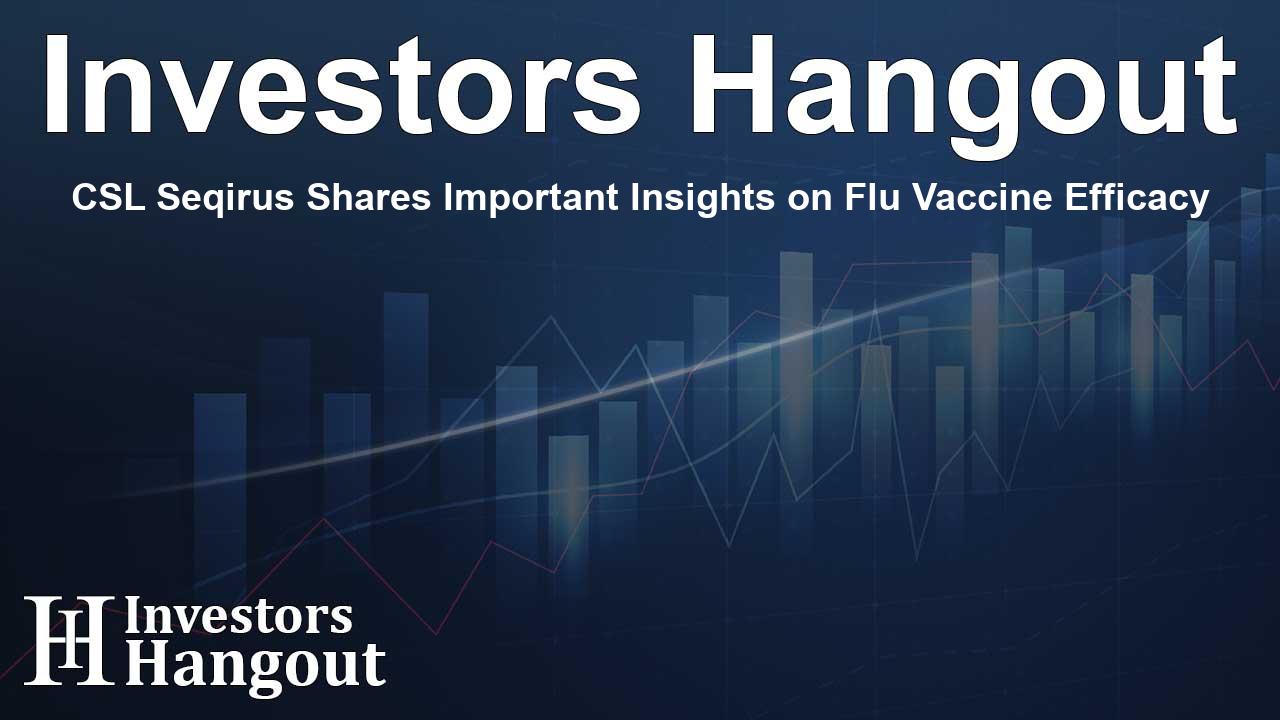CSL Seqirus Shares Important Insights on Flu Vaccine Efficacy

CSL Seqirus Shares Findings at OPTIONS XII Conference
CSL Seqirus recently made a substantial impact at the OPTIONS XII Conference, showcasing real-world evidence (RWE) studies that highlight the effectiveness of both cell-based and adjuvanted influenza vaccines. These studies aim to reinforce the importance of influenza vaccinations, particularly as the flu season approaches.
Evidence of Improved Vaccine Effectiveness
Multiple RWE studies presented at the conference have illustrated a notable improvement in relative vaccine effectiveness (rVE) of cell-based vaccines compared to the traditional egg-based vaccines. This improvement was observed across various age groups, including vulnerable populations such as toddlers as young as six months old.
Highlights from Recent Studies
One of the key findings presented indicates that during the 2023/24 season, cell-based vaccines had an outstanding effectiveness rate of 88% against medically attended, lab-confirmed influenza in children aged six months to three years when compared to unvaccinated individuals. Such statistics underscore the critical role these vaccines play in safeguarding the health of younger populations.
CSL Seqirus passionately believes in the importance of RWE studies as they complement traditional randomized controlled trials (RCTs). By collecting real-world data, they contribute significantly to the ongoing assessment of influenza vaccine effectiveness.
The Role of CSL Seqirus in Public Health
Gregg Sylvester, Chief Health Officer at CSL Seqirus, emphasized the organization's commitment to generating robust real-world evidence regarding vaccine effectiveness. He stated, "Our studies and presentations at OPTIONS XII reflect our dedication to helping protect individuals of all ages against influenza and its serious health complications."
Among the significant RWE studies discussed was a comprehensive analysis of the 2022/23 influenza season in the US. This study revealed that cell-based quadrivalent vaccines were more effective in preventing outpatient test-confirmed influenza compared to egg-based vaccines among individuals aged six months to 64 years. Results showed an improved rVE that indicates cell-based options should be prioritized.
Broader Implications of Vaccine Effectiveness
Another recent study also demonstrated that the cell culture-based inactivated influenza vaccine (ccIIV4) yielded impressive results against laboratory-confirmed cases of influenza. The findings pointed out that effectiveness was highest among the youngest age group, reinforcing the idea that targeting this demographic is essential for increasing public health safety.
Comparative Effectiveness among Different Vaccines
Additional insights from the RWE presented included finding of relatively high effectiveness of MF59-adjuvanted vaccines when compared to high-dose quadrivalent vaccines. The comparative data is crucial for healthcare professionals and patients alike, as it showcases the options available for combating influenza.
CSL Seqirus: A Leader in Influenza Vaccine Research
CSL Seqirus is proud to be at the forefront of innovative influenza vaccine research. The organization is dedicated to providing comprehensive data that not only reinforces the effectiveness of their vaccines but also enhances public health initiatives worldwide. With advanced production facilities across multiple countries, they are strategically positioned to deliver effective solutions.
The emphasis on RWE and vaccination technology reflects not only their commitment to preventative health measures but also the ongoing struggle against emerging infectious diseases.
Frequently Asked Questions
1. What are real-world evidence studies?
Real-world evidence studies analyze data collected outside of traditional randomized controlled trials to provide insights into the effectiveness of medical interventions in everyday life.
2. What did CSL Seqirus present at the OPTIONS XII Conference?
CSL Seqirus presented findings from various RWE studies demonstrating the effectiveness of cell-based influenza vaccines compared to egg-based vaccines.
3. Why is the effectiveness of influenza vaccines important?
The effectiveness of influenza vaccines is critical to public health as they help reduce the spread of influenza and protect vulnerable populations from severe illness.
4. What age groups benefit most from cell-based vaccines?
Children, particularly those aged six months to three years, show the highest effectiveness rates with cell-based vaccines, benefiting significantly from these vaccinations.
5. How does CSL Seqirus contribute to pandemic preparedness?
CSL Seqirus contributes to pandemic preparedness by leveraging its research capabilities to develop and deliver effective influenza vaccines, enhancing public health responses to epidemics and pandemics.
About Investors Hangout
Investors Hangout is a leading online stock forum for financial discussion and learning, offering a wide range of free tools and resources. It draws in traders of all levels, who exchange market knowledge, investigate trading tactics, and keep an eye on industry developments in real time. Featuring financial articles, stock message boards, quotes, charts, company profiles, and live news updates. Through cooperative learning and a wealth of informational resources, it helps users from novices creating their first portfolios to experts honing their techniques. Join Investors Hangout today: https://investorshangout.com/
Disclaimer: The content of this article is solely for general informational purposes only; it does not represent legal, financial, or investment advice. Investors Hangout does not offer financial advice; the author is not a licensed financial advisor. Consult a qualified advisor before making any financial or investment decisions based on this article. The author's interpretation of publicly available data shapes the opinions presented here; as a result, they should not be taken as advice to purchase, sell, or hold any securities mentioned or any other investments. The author does not guarantee the accuracy, completeness, or timeliness of any material, providing it "as is." Information and market conditions may change; past performance is not indicative of future outcomes. If any of the material offered here is inaccurate, please contact us for corrections.